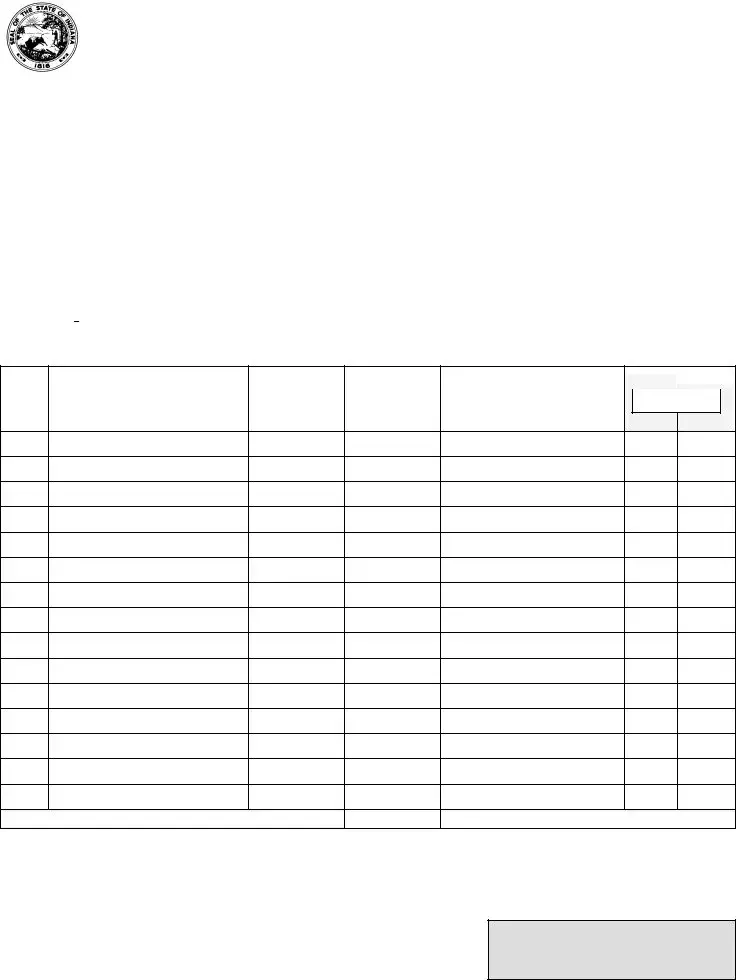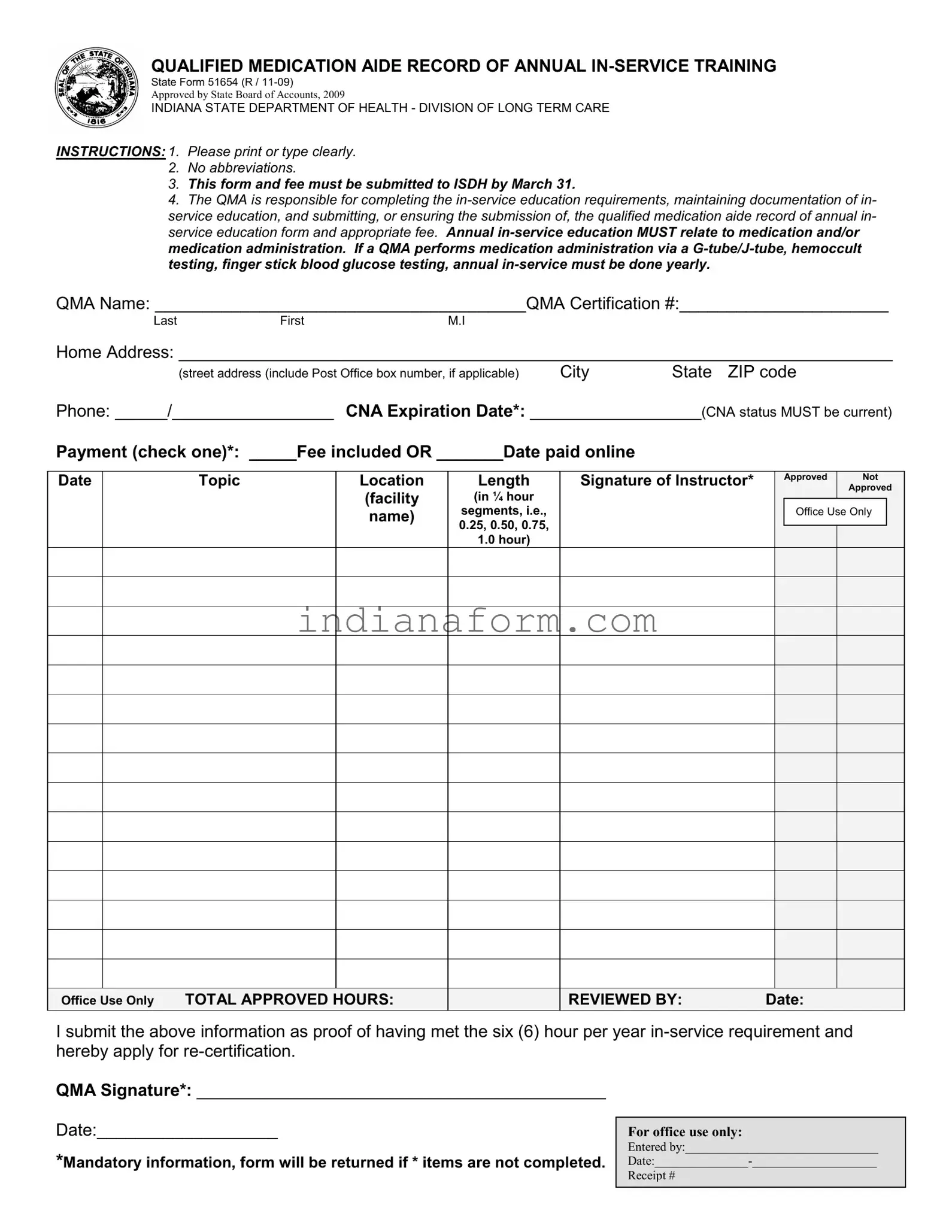
QUALIFIED MEDICATION AIDE RECORD OF ANNUAL IN-SERVICE TRAINING
State Form 51654 (R / 11-09)
Approved by State Board of Accounts, 2009
INDIANA STATE DEPARTMENT OF HEALTH - DIVISION OF LONG TERM CARE
INSTRUCTIONS: 1. Please print or type clearly.
2.No abbreviations.
3.This form and fee must be submitted to ISDH by March 31.
4.The QMA is responsible for completing the in-service education requirements, maintaining documentation of in- service education, and submitting, or ensuring the submission of, the qualified medication aide record of annual in- service education form and appropriate fee. Annual in-service education MUST relate to medication and/or medication administration. If a QMA performs medication administration via a G-tube/J-tube, hemoccult testing, finger stick blood glucose testing, annual in-service must be done yearly.
QMA Name: _______________________________________QMA Certification #:______________________
LastFirstM.I
Home Address: ___________________________________________________________________________
(street address (include Post Office box number, if applicable) City State ZIP code
Phone: __ ___/_________________ CNA Expiration Date*: __________________(CNA status MUST be current)
Payment (check one)*: _____Fee included OR _______Date paid online
Length
(in ¼ hour
segments, i.e., 0.25, 0.50, 0.75, 1.0 hour)
|
|
|
|
|
|
|
|
|
|
|
|
|
|
|
|
|
|
|
|
|
|
|
|
|
|
|
|
|
|
|
|
|
|
|
|
|
|
|
|
|
|
|
|
|
|
|
|
|
|
|
|
|
|
|
|
|
|
|
|
|
|
|
|
|
|
|
|
|
|
|
|
|
|
|
|
|
|
|
|
|
|
|
|
|
|
|
|
|
|
|
Office Use Only TOTAL APPROVED HOURS: |
|
REVIEWED BY: |
Date: |
|
|
|
|
|
|
I submit the above information as proof of having met the six (6) hour per year in-service requirement and hereby apply for re-certification.
QMA Signature*: ___________________________________________
Date:___________________
*Mandatory information, form will be returned if * items are not completed.
For office use only:
Entered by:_______________________________
Date:_______________-____________________
Receipt #
IMPORTANT NOTICE
CERTIFICATION/RECERTIFICATION/REINSTATEMENT and IN-SERVICE EDUCATION REQUIREMENTS FOR
QUALIFIED MEDICATION AIDE (QMA)
Effective January 1, 2005, the QMA certification process and in-service education requirement is mandatory every year. This is in accordance with Indiana Administrative Code 412 IAC 2-1-10. Under this rule all QMAs must meet the following three (3) requirements:
1.Be certified by the Indiana State Department of Health every year;
2.Obtain a minimum of six (6) hours per year of in-service education in the area of medication administration; and
3.Submit appropriate fee to Indiana State Department of Health with recertification request.
RECERTIFICATION:
At least 30 days prior to the expiration of the certificate, the individual must:
1.obtain a minimum of six (6) hours per year of annual in-service education;
2.submit to the Indiana State Department of Health a qualified medication aide record of annual in-service education on the form approved by the ISDH; and
3.submit to the ISDH the appropriate fee.
The QMA is responsible for completing the in-service education requirements, maintaining documentation of in-service education, and submitting, or ensuring the submission of, the qualified medication aide record of annual in-service education form and appropriate fee.
REINSTATEMENT:
If the recertification fees and/or in-service education form is received by the ISDH ninety-one (91) or more days after expiration of the QMA certification, the individual is removed from the QMA registry and must be reinstated. For reinstatement as a QMA following removal from the QMA registry, the individual must:
1.complete an ISDH approved QMA course;
2.submit to the testing entity an application approved by the ISDH;
3.pass the written competency test in three (3) or fewer attempts with a passing score of 80%.
IN-SERVICE EDUCATION REQUIREMENTS:
Annual in-service education shall include medication administration. If facility policy allows the QMA to perform such functions in the facility, annual in-service education shall also include:
1.medication administration via G-tube/J-tube;
2.hemoccult testing;
3.finger stick blood glucose testing (specific to the glucose meter used).
QMA certificates are effective upon issue and expire on March 31 of the next year. The annual in-service education requirement period begins each year on March 1 and concludes on the last day of February of the next year. In the case of an initial certificate, the annual in-service education requirement period begins on the QMA certification effective date and concludes on the last day of February of the next year. The in-service education requirement period therefore ends one (1) month prior to the expiration of the certification.
Qualified Medication Aide Record of Annual In-service Training form and fee ($10.00 check or money order payable to Indiana State Dept. of Health) should be submitted to ISDH. The form and fee must be sent to:
Indiana State Department of Health
Cashier’s Office
PO Box 7236
Indianapolis, IN 46207-7236
Failure to submit certification in a timely manner may result in additional fees or removal from the QMA registry. (Removal from the registry will require completion of a QMA course and passing of the QMA competency test for re- instatement).
If you have additional questions, please contact Gina Berkshire at gberkshire@isdh.in.gov or 317/233-7497
or Nancy Gilbert at ngilbert@isdh.in.gov or 317/233-7616.


